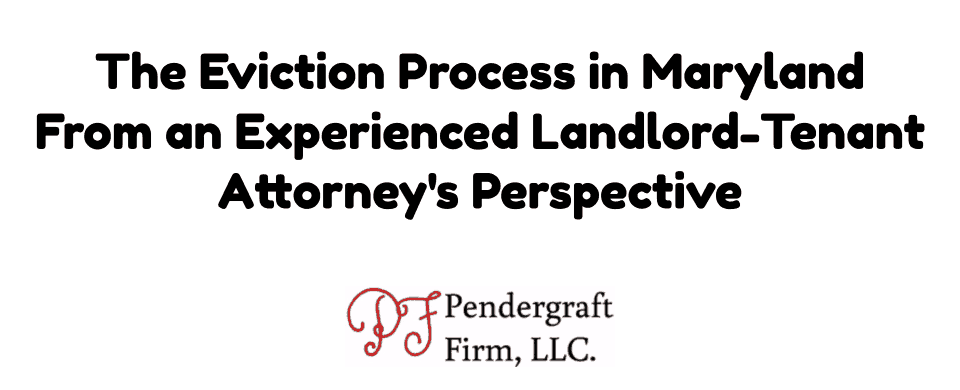Many Maryland landlords and tenants do not understand the eviction process in Maryland. This blog post is to generally cover how evictions work in Prince George’s County, Baltimore City, Montgomery County, where I primarily practice. However, the basics for eviction work the same way in each Maryland county so it should not be much different than this.
Step One: Before Filing to Evict a Landlord May Be Required to Send a Written Notice
There are three different causes of action a landlord can choose to evict a tenant, and one to evict a non-tenant. They are:
Tenant holding over and breach of lease require a landlord to send a tenant written notice before they can initiate a complaint.
Therefore for certain causes of action the first step in the eviction process is for the landlord to send their tenant a written notice.
If a landlord is unsure which cause of action is appropriate to evict a tenant check out my blog post on How to Evict a Tenant.
Step Two: Filing a lawsuit at their local district court
The next step is for the landlord to file a lawsuit at the local District Court for where the house is located. Here is a complete list of Maryland District Courts Landlord’s can call to make sure they are filing in the correct courthouse.
The landlord will be required to pay a fee to file the complaint, and a fee to pay the Sheriff to serve the complaint. Depending on what the landlord files for, he or she will be given a court date on the spot or mailed a court date.
Step Three: Sheriff Service of Process
Next the sheriff serves the tenant a copy of the complaint by going to the property the tenant is possession of. If they cannot serve the tenant personally they will post a copy of the notice to the door.
Tenant Defenses and Counter-Claims
After the tenant has been served he or she can respond by filing with the court or wait until the court date. A common defense that a tenant asserts is rent escrow.
Step Four: The Merits Hearing
At the court date the landlord presents his case and the tenant is given an opportunity to respond. A landlord that wants to evict a tenant should ask that the judge grants him or her possession of the property. The Judge then makes a decision based on the merits of the case.
Step Five: Filing The Warrant For Restitution
If landlord prevails, the next step is for him or her to file a warrant for restitution against the tenant. These forms can be completed at the District Court clerks office. For failure to pay rent, a landlord must wait 4 business days before he or she can file a warrant for restitution. For tenant holding over, breach of lease, or wrongful detainer, a landlord can file the same day that possession of the property is awarded.
Tenant’s Right of Redemption
A Judge may decide to give a tenant the right of redemption. This means that the tenant has the right to stop an eviction by paying the full amount owed on the judgment.
The Appeals Period
For failure to pay rent cases a tenant can file an appeal within 4 business days of the date a judgment is entered. In all other actions for possession a tenant may file an appeal within 10 calendar days.
Filing for an appeal does not automatically halt an eviction. In order to do so a tenant must pay an appeal bond.
Step Six: The Eviction
In most jurisdictions the Sherriff will contact the landlord to schedule an eviction date after they receive the warrant for restitution. The Sheriff will instruct the landlord to bring a locksmith and a number of people they need bring. It is the landlord’s responsibility to hire an eviction crew. An eviction lawyer does not need to be present.
Generally the tenants are not given the eviction date. However, in Baltimore City, a landlord is required to give a tenant notice of the eviction date.
If you have any questions about the eviction process in Maryland, don’t hesitate to contact a Landlord-Tenant Attorney.
Unable To Afford an Attorney or Would Rather Do It Yourself?
Check out my Maryland Landlord Self-Help Eviction Legal Kit or my Maryland Tenant Rights Legal Kit. The kits contain my strategies and sample pleadings for representing landlords and tenants in Maryland.
- How Can I Evict An Employee or Caregiver I Fired That Refuses to Leave in Maryland? - February 6, 2023
- Can A Tenant Leave Property Before The Lease Agreement Expires in Maryland? - January 29, 2023
- Can I Be Evicted or Locked Out By My Wife, Husband, Boyfriend, or Girlfriend in Maryland? - January 28, 2023


Facebook Comments